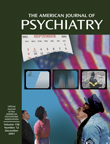To the Editor: Dr. Furukawa’s letter raises several issues regarding our update on the psychosocial treatment of schizophrenia. His criticisms revolve around our procedures for reviewing the literature and our conclusions. In regard to our methods, he states that in selecting relevant studies, we fell short of what is “currently considered standard in research synthesis.” The only example he gives of this is our failure to discuss a report by Buchkremer et al. (1995). As stated in our Method section, we focused on randomized controlled studies that used standardized instruments and were published since the last report in the
Journal on the psychosocial treatment of schizophrenia by Penn and Mueser
(1), in 1996. Dr. Furukawa fails to appreciate that we made explicit the critical questions that informed our review: What is the efficacy for the primary outcome measure? What is the efficacy for other outcomes? Is a particular kind of psychosocial intervention more efficacious for certain outcomes? What evidence exists for effectiveness and transferability? What data exist regarding cost-effectiveness?
Furthermore, we described in our Method section how 167 separate English-language references were identified with computerized literature searches and how, from these, 18 newer studies were selected. A meta-analytic approach to these heterogeneous 18 studies (three studies of family therapy, two of case management, four of social skills training, three of supported employment, five of cognitive behavior therapy, and one of individual therapy, which also had a family therapy arm) might have given some a sense of statistical comfort but would have been problematic. On the other hand, implementation of multiple meta-analyses of all the relevant published studies involving the many different psychosocial treatments for schizophrenia was clearly beyond the scope of our article.
Dr. Furukawa’s concerns regarding our conclusions are misplaced. Our article reviewed all of the higher-quality studies published since 1996; however, our conclusions and clinical recommendations were based on an appraisal of all the studies published since 1966. Hence, it is logical that although the three recent studies of family therapy resulted in negative findings, because the broader literature unambiguously supported the efficacy of some forms of family therapy for relapse prevention, we recommended it for most patients residing with their families. We stand by our interpretation that a likely explanation for the negative findings in these studies was their low base rate of relapse (18% for the 1-year study group, 27% for the 2-year group, and only 29% for the 3-year group) and agree with Dr. Furukawa that the majority of studies performed over time do not have such low rates of relapse. Likewise, the large literature on social skills training (which contained only four newer studies) clearly demonstrated that schizophrenia patients can acquire a variety of skills and improve their social competence, as measured in the clinic or in a controlled setting. However, it is not known whether patients will incorporate learned skills and use them in the community, which is a limitation of this therapeutic strategy.

